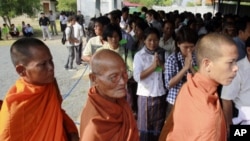The head of the Documentation Center of Cambodia on Wednesday called for the UN to take “decisive action” to investigate the office of investigating judges at the Khmer Rouge tribunal, following the abrupt resignation of its international judge on Monday.
The Documentation Center is a major researcher of Khmer Rouge atrocities, providing thousands of documents that have made the tribunal possible.
Chhang Youk, director of the center, said the resignation of German judge Siegfried Blunk—who cited government statements against further indictments as his reason for quitting—required the UN to “restore the reputation” of the court.
“Judge Blunk’s resignation has only added fuel to conspiracy theories and conjecture regarding corruption within the [Office of the Co-Investigating Judges],” Chhang Youk said in a statement.
He added in a later interview that the UN should not allow the resignation to go uninvestigated.
The UN-backed court, which has spent $150 million so far, has been dogged by allegations of corruption, mismanagement and political interference since its 2006 inception. In 2007, Cambodian staff at the court said they were obliged to pay kickbacks in order to keep their jobs, though an audit later found only “small irregularities” at the court.
The tribunal went on to try one leader, Duch, for atrocity crimes at the notorious Tuol Sleng prison, and it is in the process of preparing for its second case, to try senior leaders Nuon Chea, Khieu Samphan, Ieng Sary and Ieng Thirith. All four are growing old and infirm, and observers have worried the court will fail to try them before they die.
Blunk and his Cambodian counterpart, judge You Bunleng, meanwhile, have been under intense scrutiny since April, when they hastily concluded their work in a third case, which is staunchly opposed by Prime Minister Hun Sen and other senior government leaders.
You Bunleng said in a statement late Wednesday that he has worked “closely” with Blunk on cases 003 and 004—which would require five more indictments by the court—“without any objection and against any attempt of interference.”
The Ministry of Foreign Affairs said in a statement Wednesday government officials, including Foreign Minister Hor Namhong, “have never and will never interfere” in the court’s work.
Chhang Youk said Wednesday that no action from the UN make the tribunal and the international body seem “complicit” with the Cambodian government position and will have compromised justice for the victims of the regime.




